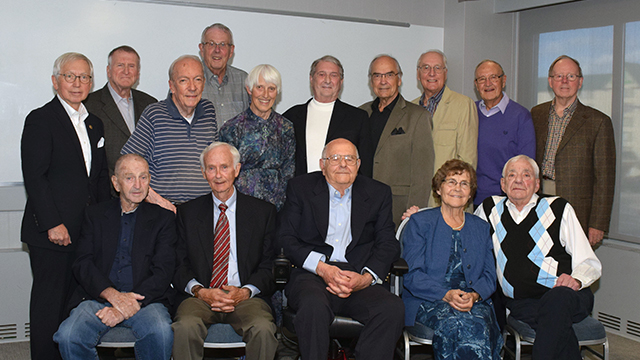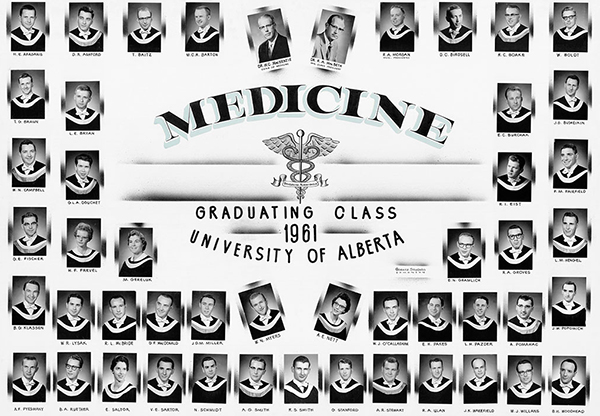
The attendees of the '61 alumni reunion in 2016, left to right. Front row: Tim Myers, Larry Bryan, Harry Afaganis, Madeline McPherson, Fin Fairfield. Middle Row: Dale Birdsell, Bill O'Callaghan, Elizabeth Saltor, Vic Sartor, Nis Schmidt, Ben Ruether, Fred MacDonald, Rod Morgan. Back row: Ray Ulan and Rex Boake.
Rex Boake and Fred MacDonald greet each other like best friends with a jovial embrace, share jokes and catch up over a cup of coffee on a winter morning in Edmonton. For almost six decades, Boake and MacDonald have shared many moments together as friends, colleagues and organizers of their MD class reunions.
The Faculty of Medicine & Dentistry '61 alumni group celebrated its 55th anniversary in 2016, continuing the longstanding tradition of meeting every five years without exception.
"Our class grew pretty close together," says Boake. "At the end of our fourth year of medicine we decided right then that we should have a class reunion. Everybody put in five dollars towards the first reunion. If you put in five bucks, it was so much money back then, it was almost guaranteed you would come for sure!"
"Maybe half a dozen of us were married at the time we graduated. The spouses knew each other and knew the class. You know, if you go to a party with your wife and it's full of her friends and you don't know a soul, you won't want to go the next time. Our class reunion had enough spouses that enjoyed being together."

The alumni of 1961 and their spouses.
The tradition began with the fifth anniversary in 1966, but it wasn't until the 25th anniversary reunion in 1987 that Boake and MacDonald decided to take on the task of organizing the events. They wanted to come up with new ideas and activities to keep binding the group together. "So Fred and I 'got the job,'" continues Boake. "We didn't need to discuss it, because everything we seem to do, we seem to think exactly alike."
MacDonald nods in agreement with him.
Over time, the plans for the class reunions have gradually evolved to accommodate their life stage preferences and needs-a dinner is now the main event, usually followed by a casual breakfast the next day.
"We had the reunions in many different places when we were younger, and all of those were two-to-three-day reunions. We are sort of passed that stage," says Boake.
"One night is about all we can take now!" jokes MacDonald.
Partners in health
"We started with 65 students in the first year. By the second day of medicine-after the anatomy lab-there were 62," says MacDonald, laughing. The final count for the graduating U of A class in 1961 was 48 doctors. Their journey through the faculty was full of anecdotes and outstanding mentors-their medicine and surgery professors included tough World War II veterans, like the renowned former dean Walter Mackenzie himself.
"They were no nonsense guys," remembers MacDonald. "Walter Mackenzie used to give Surgical Anatomy on Saturday mornings. On a winter day like today in the auditorium, it was cold outside and just as cold inside, and we had to go to class at eight o'clock with a shirt and tie. You had to dress up like a doctor. For the first session in October, everybody had been told by the previous class, 'make sure you show up.' Well, we had a little party the night before, and probably about 20 of us showed up. He walked in-he was a big, big man-and he asked, 'How many are in your class?' Somebody ventured a number. He asked for a piece of paper and a pen, and everybody wrote their name down on that paper, which he kept the whole year. We had a great session. I think that day was the last question Walter Mackenzie asked me, because he kept asking the questions to all the people who didn't show up the first day!"
They agree that the most daunting part for the students was going through oral examinations,
particularly for surgery. "These orals were usually at night," says MacDonald. "So we were in class all day, and we already knew who would be conducting the exams. We were just waiting to be 'crucified' starting at seven o'clock at night." They knew their professors were so rigorous, that they could tell students to come back next year before even taking the exam, if it was considered that they were not up to snuff.
The group faced all these adventures and challenges with humour, camaraderie and good spirit, which made their bond much stronger as friends, and grew their support for each other. "We've all had our ups and downs and needed each other," says MacDonald. "That's what kept us going through tough times."
Making history together
The alumni from '61 stand out for their commitment to each other, but also because of their talents as a generation of physicians that built our faculty and wrote Western Canada's medical history.
In 2017, the University of Alberta Hospital, the Faculty of Medicine & Dentistry and the Alberta Transplant Institute are celebrating the 50th anniversary of the first kidney transplant in Alberta, which led to a very successful renal transplant program with late William Lakey and Rex Boake as pioneers and leaders in that field. Boake also collaborated and received training with the University of California, Los Angeles (UCLA) during the 1960s to advance the fields of urology and renal transplantation.
Fred MacDonald was an innovator of pulmonary function and rehabilitation. He designed the first Intensive Care Unit in Edmonton in 1971, and established ventilation techniques that saved many lives. MacDonald also led the pulmonary rehabilitation program during the 1990s, and helped introduce remote cardiothoracic pulmonary assessment to remote health centres through telehealth.
Another remarkable '61 alumnus was Ray Ulan, pioneer of hemodialysis in Alberta, also honoured during the celebrations of the renal transplant anniversary.
"We were really privileged to be in that group of people who were at the forefront," says MacDonald.
Both physicians speak with a special admiration about their classmates and their accomplishments, and consider that the faculty has been a fertile breeding ground for great contributions to Canadian health care.
"Bedside skills are some of the most recognized for Faculty of Medicine & Dentistry professionals," says MacDonald. "It is a kind of training where the university excels."
"Our university has not been recognized as it should," adds Boake.
Maybe they will save that conversation for the next reunion.